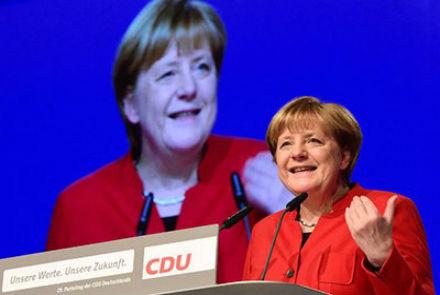Chancellor Angela Merkel Tuesday lashed populists seeking to exploit Germany's refugee influx, but set down a tough line on integration -- including a ban on the full-face veil -- as she launched into election campaign mode.
Outlining a strategy to counter populism that has consumed key allies abroad, Merkel vowed there would be no repeat of last year's record refugee arrivals.
She also stressed it was legitimate for Germany to expect newcomers to integrate, and this included a rejection of the niqab full-face veil.
"The full veil must be banned wherever it is legally possible," she told the annual gathering of her center-right Christian Democratic Union (CDU), urging them to back her bid for a fourth term.
Merkel was rewarded with a standing ovation that lasted more than 11 minutes as the majority of the 1,001 delegates present rallied behind her.
"She took on a new tone, she signalled that in the future, refugee and immigration policies will be more restrictive," Wolfgang Reinhart from the south-western region of Baden-Wuerttemberg told AFP.
But dissenters made their voices heard when delegates were asked to re-elect Merkel as chief for the next two years, as the congress gave her just 89.5 percent -- her second worst score, and the worst since she became chancellor in 2005.
Her lowest was in 2004, when she was approved by 88.4 percent.
National media had suggested that a score below 90 percent would be a slap in the face.
Merkel, who has led Germany for 11 years, last month confirmed she would run for a fourth term but acknowledged that the election would be "more difficult" than any other she has contested.
Beyond domestic issues, Merkel also devoted a large part of her address to crises abroad as she noted that in 2016, "the world has not become stronger and more stable, but weaker and more unstable".
She deplored the failure of the international community to alleviate the suffering in Syria's besieged city of Aleppo, calling it a "disgrace".

